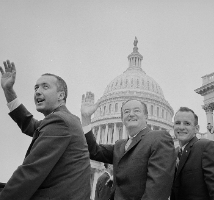
On July 20, 1969, man landed on the moon. Many events and influential personalities led to this momentous occasion. In an address to a joint meeting of Congress upon Apollo 11s return, however, astronaut Neil Armstrong declared: "It was here in these Halls that our joint venture really began." The Space Program could not have taken off without the Senate.


Astronauts Alan Shepard, Gus Grissom, and John Glenn testified before the Senate Aeronautical and Space Sciences Committee on February 28, 1962, following Glenn's successful orbit around the Earth aboard the Mercury capsule Friendship 7 on February 20.
On November 16, 1963, Florida senator George Smathers joined President John F. Kennedy for a tour of Cape Canaveral. They were briefed by astronauts Gus Grissom and Gordon Cooper and other NASA officials.


Vice President Hubert Humphrey escorted Gemini 4 astronauts James McDivitt (left) and Edward White (right) to the Capitol, where they briefly addressed both the Senate and the House, following their successful mission earlier that month.
In 1957 the Soviet Union launched the Sputnik space satellite, sending shock waves across the United States. But the Sputnik satellite served an additional purpose: as a catalyst for the American space program.
That October, Senate Majority Leader Lyndon B. Johnson began gathering support in the Senate for a comprehensive space program. The next year, Congress passed the National Aeronautics and Space Act of 1958, creating NASA and the National Aeronautics and Space Council, consisting of political leaders and private citizens, to help coordinate NASA's mission.
Also in 1958, the Senate created the Committee on Aeronautical and Space Sciences to serve as a standing committee on space. After Sputnik, Johnson made space funding one of his top priorities and worked with fellow senators Robert Kerr and Styles Bridges, chairman and ranking Republican member, respectively, of the Senate Committee on Aeronautical and Space Sciences, as well as several entrepreneurs and businessmen, to raise support for the space program. Senator Margaret Chase Smith was another lifelong supporter.
The following year, NASA issued its "Long Range Plan of 1959." It declared eight explicit goals, including human space travel. A committee was formed in 1960 called "The Presidents Science Advisory Committee," and it issued its "Report of the Ad Hoc Panel on Man-in-Space." Here it made clear its support for a man to orbit the earth, circumnavigate the moon, and to land on the moon. President Dwight Eisenhower balked at the bulky price tag, however, refusing to "hock my jewels" to finance it. 1
When John F. Kennedy became president in 1961, he challenged Congress to send a man to the moon. Before taking any action, he asked Vice President Lyndon Johnson to speak with the council to forge a consensus in support of the goal. Once he had Johnsons assurances that they were in agreement, Kennedy addressed a joint session of Congress on May 25, 1961, and asked the nation to "commit itself to achieving the goal, before this decade is out, of landing a man on the moon and returning him safely to earth."
Eight years later, on July 20, 1969, Neil Armstrong and fellow astronaut Buzz Aldrin stepped on the moon and then returned to address a joint meeting of Congress. "Scientific exploration implies investigating the unknown," Aldrin said. "Our steps in space have been a symbol of this countrys way of life as we open our doors and windows to the world to view our successes and failures and as we share with all nations our discovery." Without the Senate, these words would never have been spoken, at least not for many years to come.
1 Bill Kauffman, "Lunar Skeptics," The American Enterprise, December 2004.Historical information provided by the Senate Historical Office.
It was up to the first Senate in 1789 to organize, establish its rules, and set precedents that would govern its actions in years to come, evolving into a complex legislative body.